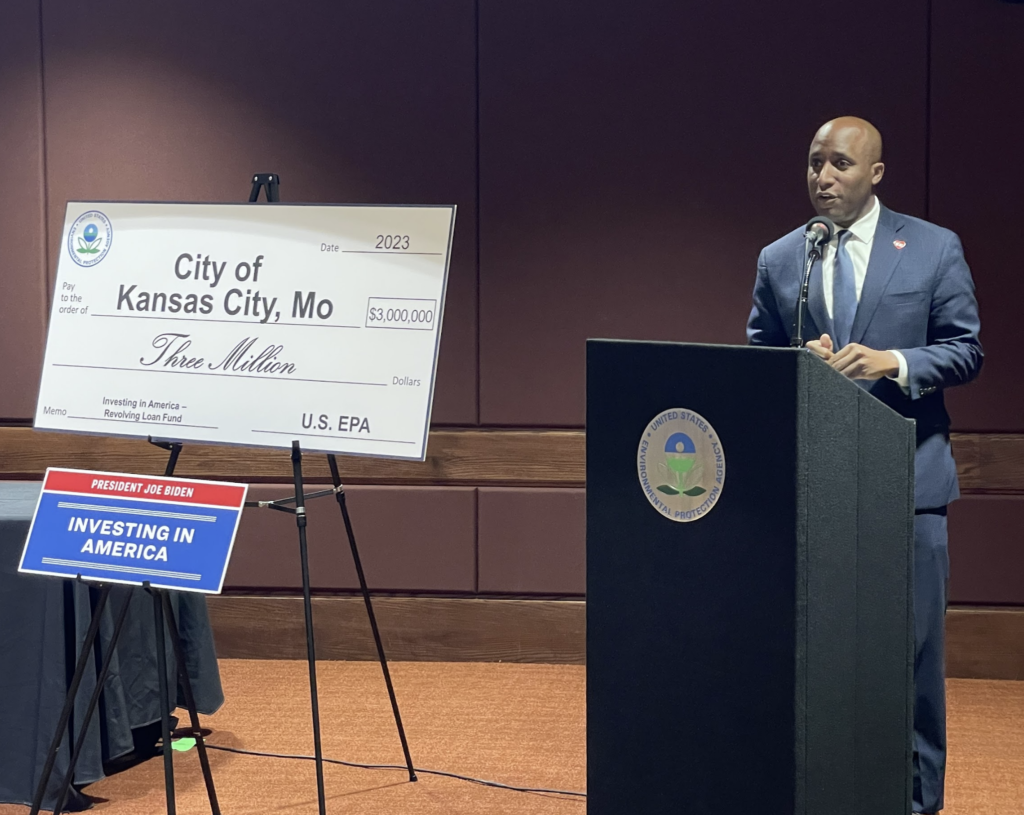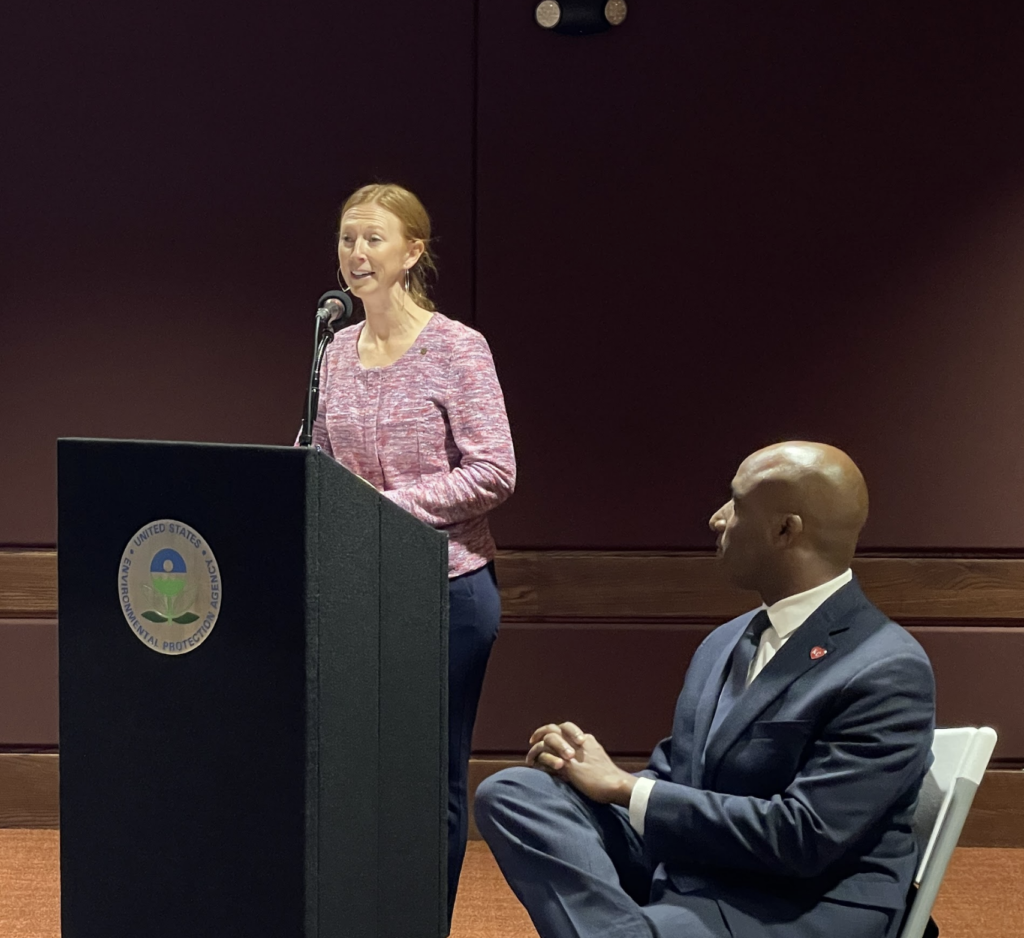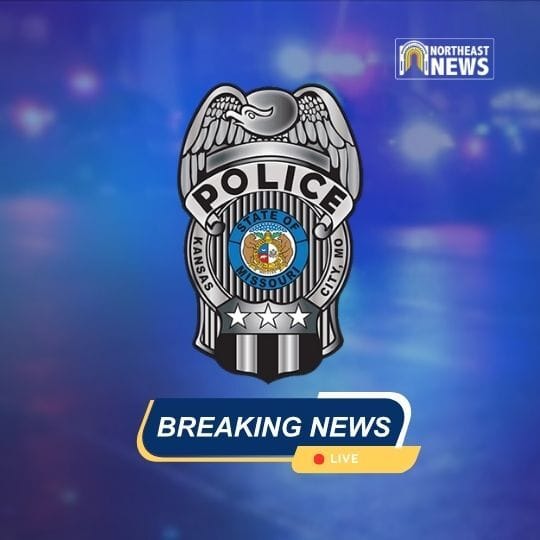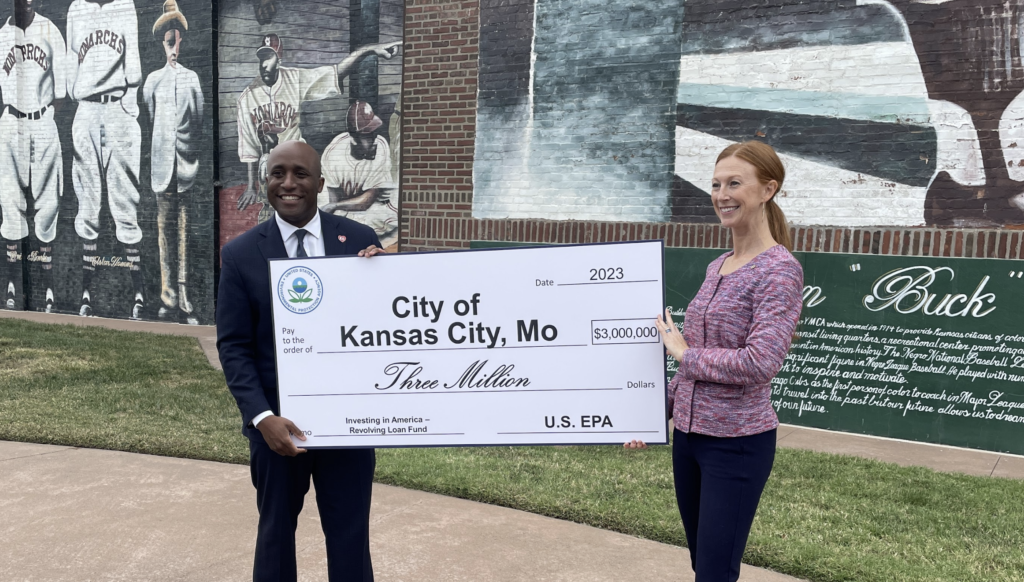
Abby Hoover
Managing Editor
On Thursday, October 12, the U.S. Environmental Protection Agency (EPA) Region 7 presented a $3 million ceremonial check to the City of Kansas City, Missouri, at the Buck O’Neil Education and Research Center at 18th and The Paseo Boulevard.
Brownfields are any vacant or underused properties where reuse is complicated by real or perceived environmental contamination. Examples can include a former gas station, an office building with asbestos and lead-paint, a closed steel plant, or a former dry cleaner. Brownfields contribute to health risks, blight, economic decline, and environmental burdens, especially in communities of color.
The EPA selected the City of Kansas City to receive an additional $3 million for its Brownfields Revolving Loan Fund (RLF) through the Bipartisan Infrastructure Law. This selection is in addition to the nearly $8.5 million in funds previously awarded to the city, which has successfully made loans or subgrants to 11 cleanup projects that are already completed or in progress. Directly following the event, EPA and KCMO Brownfields representatives toured two Brownfield properties.
This funding is supported by President Biden’s Bipartisan Infrastructure Law, which provides a total of $1.5 billion to advance environmental justice, spurs economic revitalization, and creates jobs by cleaning up contaminated, polluted, or hazardous brownfield properties.
“We thank you for all that you do to make sure that these projects can be successful,” Mayor Quinton Lucas said. “Brownfield redevelopment is a story of overcoming great odds to transform sometimes discarded, contaminated land and buildings into hope, and to help communities share equally in the promises of health, vitality and prosperity that Kansas City and our nation have to offer.”
Lucas said the Buck O’Neil Educational Research Center (BOERC) is one such example. The center, announced earlier this year, is named in memory of Negro Leagues legend Buck O’Neil. An important expansion project that will be housed in the Paseo YMCA, it was in that historic building that Andrew “Rube” Foster established the Negro Leagues in 1920.
The BOERC will become a public use facility that incorporates the latest in interactive technology and state-of-the-art research equipment. The Center will allow visitors, students, researchers, and baseball fans to study every aspect of the Negro Leagues and social history.
When complete, the renovated building will house more than 40,000 square feet of archival materials, educational areas, exhibits, conference facilities and administrative offices that will advance the museum’s mission and strengthen the museum’s position as an internationally recognized attraction and institution.
The EPA Brownfields Program provided over $500,000 for the cleanup of asbestos, lead paint and mold for this project. The City of Kansas City contributed over $100,000 to finish the remaining cleanup to refurbish and reuse the culturally significant and historic site.
“In the true spirit of Kansas City, the Negro Leagues Baseball museum, working with the EPA, the City of Kansas City and others, has helped to clean up mold and water damage, remove other contaminants, have helped to reimagine what this space could be, and allow children and so many others who walk through this neighborhood to see not just the greatness of the Paseo YMCA, but also see the future of what our community can have, right here in the urban core of Kansas City, right here in the Third District,” Lucas said.
Since 1996, the EPA has provided Kansas City nearly $20 million in federal Brownfield grants that have cleaned up 161 acres of contaminated land and nearly 1.2 million square feet of blighted buildings, Lucas said. The grants have helped Kansas City create 1,500 new jobs and leverage over $582 million in new investment.
“These are big deals for Kansas City, and the important thing about this is these are big deals that are being done in areas of the city that are too often under-invested and under-appreciated,” Lucas said. “And we are now making a difference, a difference in Kansas City’s East Side and a difference in historic communities throughout Kansas City.”
EPA Region 7 Administrator Meg McCollister oversees Iowa, Kansas, Missouri, Nebraska, and nine Tribal Nations.
“Investing in communities to make them healthier, cleaner, and more economically competitive is a top priority of the EPA, and it’s really what the Brownfields Program is all about,” McCollister said. “I’m happy to announce that Kansas City has been selected to receive $3 million in Brownfields Revolving Loan Funds to use for various projects within the city.”
This funding has the potential to build on some cleanup work already started on several projects within the city, like the Hardesty Federal Complex at 5401 Independence Ave., which was awarded a grant last year, McCollister said.
“We can make this exciting announcement today because of President Biden’s Bipartisan Infrastructure Law, which is a once in a generation financial investment in a nation that will have significant positive impacts on the health and environment and communities across the nation,” McCollister continued. “Through this funding, $1.5 billion – that’s billion with a “B” – was set aside for Brownfields throughout the United States and this is the single largest investment in Brownfields infrastructure ever, and will have spurred even more redevelopment and investment.”
Communities all over the United States have leveraged more than $34 billion in cleanup and redevelopment grants, which have led to the creation of more than 175,000 jobs, McCollister said.
“Redeveloped Brownfield sites even have positive impacts on nearby residential properties, which can see a 15% increase in value after redevelopment, and most importantly, these projects also include strategies to minimize displacement and ensure that people most impacted by Brownfields also benefit from the renewal,” McCollister said.
Third District Councilwoman Melissa Patterson Hazley said the Brownfields Revolving Loan Fund is a very important funding source.
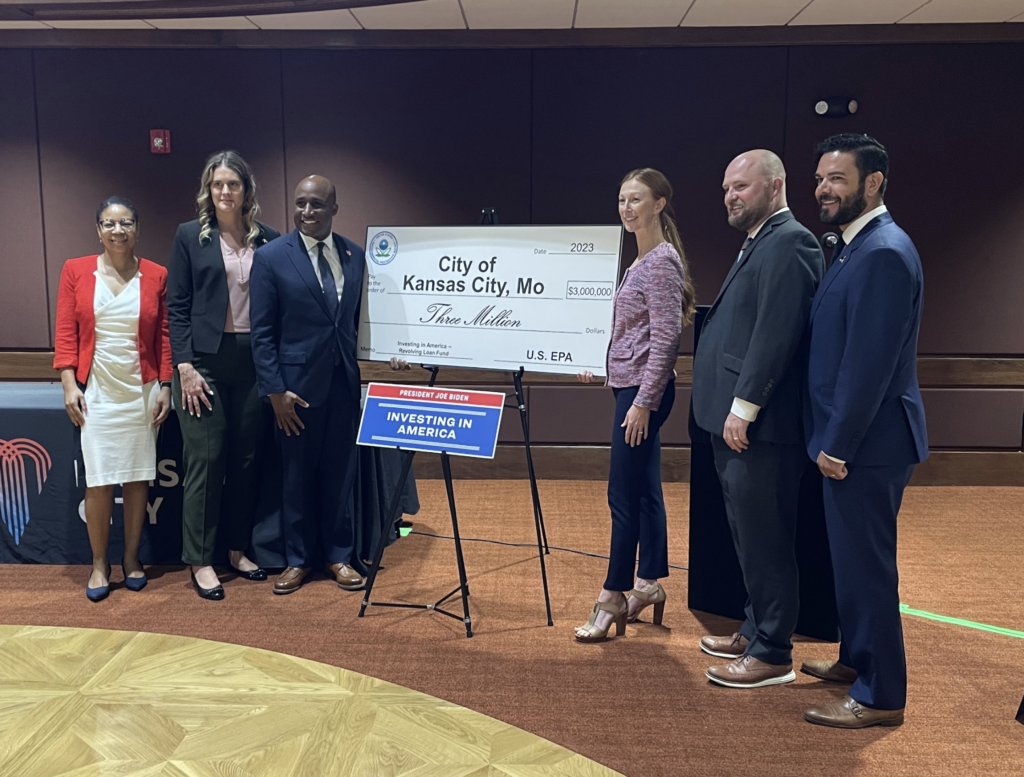
“I think that Andrew Brecker and his team have created a really fair process to find out which properties that we want to make investment in,” Patterson Hazley said. “There’s so many Brownfields, especially in the Third District. How do you choose? For example, we have thousands of vacant lots and the majority of them are going to need some type of environmental remediation. So it’s going to take all these different creative funding sources, including the federal government, if we’re going to even make a dent in that.”
Patterson Hazley has noticed more private partners joining forces with public investment in recent years.
“I think that’s why we see so much synergy with 2000 Vine, for example, that has a brewery, and then they have an event space next door,” Patterson Hazley said. “You see apartment buildings going up, there’s going to be a theater where the Black Repertory Theater will eventually be housed. So there’s a lot of synergy and excitement.”
The Third District is a gem, known for barbecue, jazz, culture and so much more, Patterson Hazley said.
“I think that people are starting to take notice that the Third District needs a little bit more TLC since we are Kansas City, and so people are getting more interested,” Patterson Hazley said. “And I’m just happy to be a part of it as an elected official and trying to help facilitate good projects, bring people to the table to collaborate. So I’m just happy to be a part of where we’re headed.”
Kansas City’s Brownfields Commission is a 15-member body created by City ordinance to promote the cleanup and reuse of Brownfield properties in order to create jobs, increase the tax base, remove potential threats to public health and the environment, or otherwise productively reuse idle, abandoned or underutilized properties.
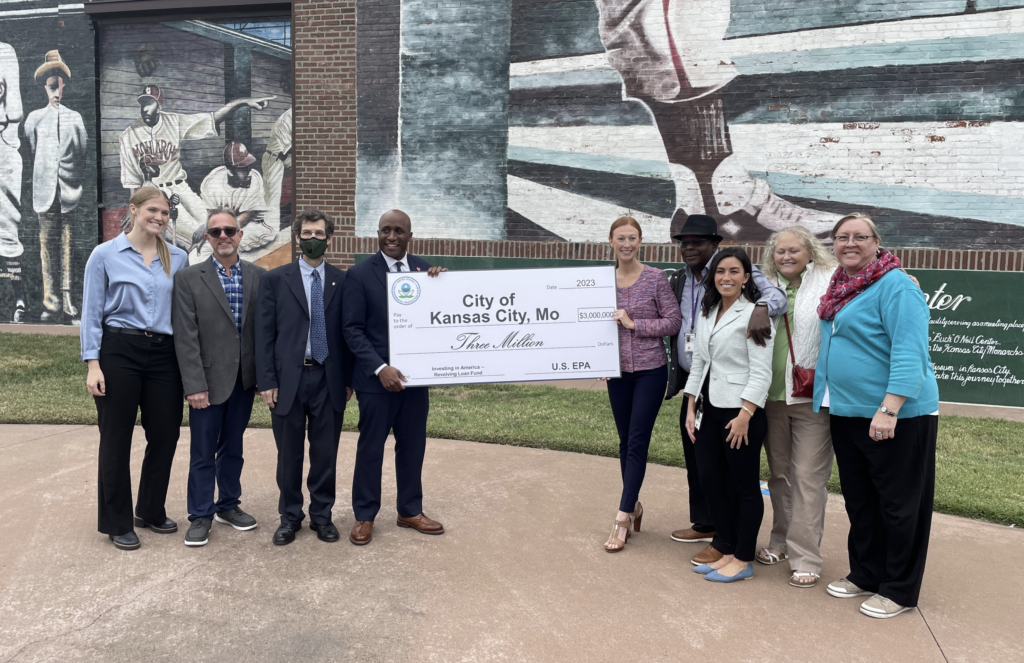
Meeting on a quarterly basis, the Commission reviews projects seeking loans and subgrants from the Kansas City Brownfields Revolving Loan Fund (RLF) program and makes recommendations to the City Council concerning such applications. It also reviews projects seeking Missouri Brownfield tax incentives and makes recommendations to the City Council whether or not to endorse such projects. Meeting notices are posted on the calendar of the City Clerk webpage, clerk.kcmo.gov.


